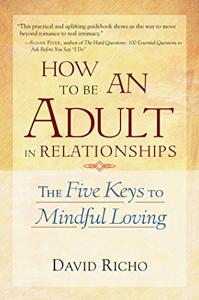
Want to learn the ideas in How to Be An Adult in Relationships better than ever? Read the world’s #1 book summary of How to Be An Adult in Relationships by David Richo here.
Read a brief 1-Page Summary or watch video summaries curated by our expert team. Note: this book guide is not affiliated with or endorsed by the publisher or author, and we always encourage you to purchase and read the full book.
Video Summaries of How to Be An Adult in Relationships
We’ve scoured the Internet for the very best videos on How to Be An Adult in Relationships, from high-quality videos summaries to interviews or commentary by David Richo.
1-Page Summary of How to Be An Adult in Relationships
Overview
Love is a mystery. We can’t understand it, no matter how much we love or for how long.
To David Richo, love is more than a feeling. It’s about being present and understanding each other.
We are all born with the capacity to love, but some people who have been abused or neglected in their childhoods may find it difficult to relate and commit.
In this passage, we’ll explore how to be more loving and open to receiving love. We’ll look at practices for resolving childhood issues and relinquishing fears of intimacy. You will also learn the five concepts of mindful loving; how to begin healing your emotional scars; and strategies for ending a relationship peacefully.
Big Idea #1: Five aspects of mindful loving are central to love relationships.
What’s your earliest childhood memory? Perhaps it’s being read to by your parents or falling and getting a bandage. When we’re young, our parents are responsible for meeting some of our emotional needs—acceptance, attention, appreciation, affection and allowing us to be ourselves.
It is important to receive the five hallmarks of love from our parents in order to build a coherent identity and personality. It also helps us develop self-esteem, which is crucial for building strong bonds with our partners later in life.
The key message is that there are five aspects of mindful loving. They include the ability to nurture, be serene and enhance one’s power to love. These can help people foster personal growth in their lives at every stage.
Relationships are built on trust. The author says that this is achieved by listening to our partner’s thoughts and emotions, as well as supporting them emotionally. We must be mindful of their past experiences and not judge them for it.
The first A is acceptance. Acceptance of ourselves and others is the foundation for a healthy relationship. When we find someone who accepts us with all our flaws, it’s liberating because we don’t have to hide any part of ourselves from them. The second A is appreciation—valuing our partners’ gifts and supporting their dreams even when they’re different than ours. The third A is affection, which includes physical contact like kisses or hugs that make us feel loved and wanted. Fourth, there’s allowing life to be what it is without trying to control it too much; this allows us to be present in a relationship. And finally comes love, which means caring for each other despite the ups and downs of relationships.
Big Idea #2: Childhood can leave us with emotional scars that affect our adult relationships.
As a child, David Richo spent several weeks each summer at his Aunt Margaret’s farm. He remembers how her fridge was always full of food while the one in his parents’ house was empty most of the time. Later on in life, he realized that he had been deprived of love and support for most of his childhood.
A key message is that childhood experiences can affect our behavior in adulthood. This is because the needs of children, like attention and affection, aren’t always met by their parents. In fact, if a child’s needs are unmet they could grow up to be abusive partners later on.
When abused children feel unloved, they keep going back to their parents to fill the void – only to be shunned again. They think, “You keep hurting me, but I can’t leave you.”
This is why so many people stay in abusive relationships as adults. They believe that their partners are right to abuse them, and they don’t think they can find love elsewhere.
Many children who are abused grow up to be abusers themselves. They may not even realize that they’re repeating their parents’ mistakes, but they do it anyway. For example, if a child grew up in a chaotic household where everyone was yelling at each other all the time and the child never knew what would set off his or her father, then as an adult that person might create drama with his or her partner by bringing up something from the past that he or she didn’t deal with when it happened.






